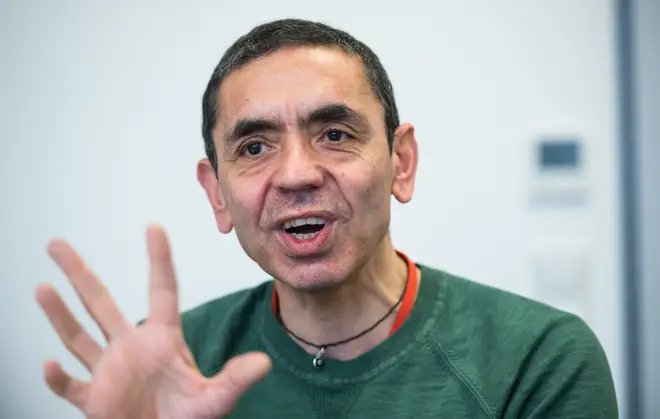
Iain Dale 7pm - 10pm
15 November 2020, 17:39

One of the scientists behind the first promising Covid-19 vaccine has said the impact of the jab will kick in next summer and normality should return by next winter.
Chief executive of BioNTech, Professor Ugur Sahin, said it was "absolutely essential" to have a high vaccination rate before autumn next year to ensure a return to normal life.
He acknowledged that the next few months will be "hard" and that the promising preliminary results on the vaccine, created in partnership with Pfizer, will not have an impact on infection numbers in the current wave.
Interim results from the jab were found to be more than 90% effective, the two firms announced last week, but safety and additional efficacy data continue to be collected.
Read more: Expert urges against 'flip-flopping' between pandemic and economy
Read more: What is an RNA vaccine and how does it work?
"If everything continues to go well, we will start to deliver the vaccine end of this year, beginning next year," Professor Sahin told reporters.
"Our goal is to deliver more than 300 million of vaccine doses until April next year, which could allow us to already start to make an impact.
"The bigger impact will happen until summer, the summer will help us anyway because the infection rate will go down in summer."

Jo Stevens on need to monitor disinformation on Covid vaccine
He added: "What is absolutely essential is that we get a high vaccination rate before autumn/winter next year, so that means all the immunisation, vaccination approaches must be accomplished before next autumn.
"I'm confident that this will happen, because a number of vaccine companies have been asked to increase the supply, and so that we could have a normal winter next year."
Professor Sahin said on Sunday the "key side effects" seen so far were a mild to moderate pain in the injection site for a few days, while some of the participants had a mild to moderate fever for a similar period.
Read more: Anti-vaccination posts on social media should be 'stamped out' - Labour
Read more: UK guilty of 'really low calibre of pandemic planning'
It comes amid calls from Labour for emergency legislation to "stamp out" conspiracy theories about coronavirus vaccines ahead of any potential rollout.
Speaking on Sunday, shadow health secretary Jonathan Ashworth said there should be penalties for social media platforms which allow misinformation to spread.
He said fewer people choosing to take the jab due to online misinformation was "the last thing we want", while calling on the Government to deal with "some of the dangerous, nonsensical anti-vax stuff that we've seen spreading on social media".

Dr Martin Edobor calls for BAME inclusion on vaccine list
On Sunday, the Government said a further 168 people had died within 28 days of testing positive for Covid-19.
As of 9am, there had been a further 24,962 lab-confirmed cases of coronavirus in the UK, according to Government data.
Elsewhere, Professor John Edmunds, a member of the Scientific Advisory Group for Emergencies (Sage), urged a long-term strategy when it comes to balancing the economy and the pandemic.
He raised concerns about "flip-flopping" between incentives such as Eat Out To Help Out and widespread closures.
Read more: Compulsory Covid vaccine would have 'marginal impact' on uptake, argues health expert
"We need to take a long-term view and be sensible and realise that we're going to have to have restrictions in place for some time," he added.
"Yes, we can lift them when it's safe to do so, which will be primarily when large numbers of people have been vaccinated.
"But flip-flopping between encouraging people to mix socially, which is what you're doing by encouraging people to go to restaurants and bars, versus then immediately closing them again, isn't a very sensible way to run the epidemic."
Professor Edmunds, of the London School of Hygiene and Tropical Medicine, also said it was "too early to judge" if 2 December was too soon to lift the current lockdown restrictions.